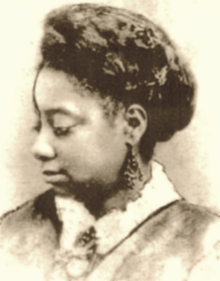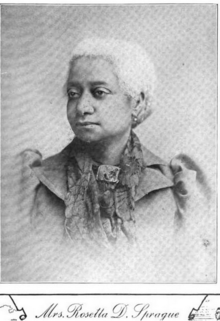Rosetta Douglass
Rosetta Douglass Sprague | |
|---|---|
 | |
| Born | Rosetta Douglass (1839-06-24)June 24, 1839 |
| Nationality | United States |
| Known for | Activism |
Notable work | "My Mother as I Recall Her" |
Rosetta Douglass-Sprague (1839 June 24 – 1906) was a prominent African-American teacher and activist. She was a founding member of the National Association for Colored Women. Her father was Frederick Douglass.[1][2]
Contents
1 Life
2 Education
3 Career
4 Activism
5 References
6 External links
Life

Rosetta D. Sprague, from a 1902 publication.
Rosetta was born to Anna Murray-Douglass and Frederick Douglass in 1839, in New Bedford, Massachusetts.[2][3] When she was five, she moved with her parents to Lynn, Massachusetts.[3] She was the eldest of five children. Rosetta was a critical thinker like her father, but struggled against the demands of gender roles during her time.[2] When she was six, she stayed with Abigail and Lydia Mott, from Albany, New York. Abigail taught her to read and write, and Lydia taught her to sew.[3] At the age of 11, she assisted her father in making and packaging his newspaper. On December 24, 1863, she married Nathan Sprague.[3] Her husband was an ex-slave and poorly educated, and struggled to find his footing and a job.[4] She did not support her father's interracial marriage after her mother's death.[2] She had seven children (including Fredericka Douglass Sprague Perry), and many grandchildren.[5]
Education
In 1845, the Rochester Board of Education closed public schools to black students. Frederick Douglass sent Rosetta to a private school rather than send her to an all-black school that Rochester set up for black students. She eventually was tutored between the ages of two and seven.[1][2] In 1848, Rosetta was admitted into the Seward Seminary in Rochester, New York. Rosetta was segregated from the white students while she was there, and her father spoke out against this in his newspaper.[2] She also attended Oberlin College’s Young Ladies Preparatory and New Jersey's Salem Normal School.[2]
Career
Douglass worked as a teacher. She eventually became primarily a homemaker and wife. She wrote the paper My Mother as I Recall Her in 1900, as well as the paper What Role is the Educated Negro Woman to Play in the Uplifting of Her Race?[6]
Activism
Douglass worked along with her father, and had a keen sense of social justice issues.[2] She advised her father against accepting the presidency of the Freedman’s Bank.[2] She went on to become a founding member of the National Association for Colored Women.[2]
References
^ ab "Rosetta Douglass Sprague". University of Rochester Frederick Douglass Letters Project - River Campus Library. River Campus Library. Retrieved April 15, 2017..mw-parser-output cite.citationfont-style:inherit.mw-parser-output .citation qquotes:"""""""'""'".mw-parser-output .citation .cs1-lock-free abackground:url("//upload.wikimedia.org/wikipedia/commons/thumb/6/65/Lock-green.svg/9px-Lock-green.svg.png")no-repeat;background-position:right .1em center.mw-parser-output .citation .cs1-lock-limited a,.mw-parser-output .citation .cs1-lock-registration abackground:url("//upload.wikimedia.org/wikipedia/commons/thumb/d/d6/Lock-gray-alt-2.svg/9px-Lock-gray-alt-2.svg.png")no-repeat;background-position:right .1em center.mw-parser-output .citation .cs1-lock-subscription abackground:url("//upload.wikimedia.org/wikipedia/commons/thumb/a/aa/Lock-red-alt-2.svg/9px-Lock-red-alt-2.svg.png")no-repeat;background-position:right .1em center.mw-parser-output .cs1-subscription,.mw-parser-output .cs1-registrationcolor:#555.mw-parser-output .cs1-subscription span,.mw-parser-output .cs1-registration spanborder-bottom:1px dotted;cursor:help.mw-parser-output .cs1-ws-icon abackground:url("//upload.wikimedia.org/wikipedia/commons/thumb/4/4c/Wikisource-logo.svg/12px-Wikisource-logo.svg.png")no-repeat;background-position:right .1em center.mw-parser-output code.cs1-codecolor:inherit;background:inherit;border:inherit;padding:inherit.mw-parser-output .cs1-hidden-errordisplay:none;font-size:100%.mw-parser-output .cs1-visible-errorfont-size:100%.mw-parser-output .cs1-maintdisplay:none;color:#33aa33;margin-left:0.3em.mw-parser-output .cs1-subscription,.mw-parser-output .cs1-registration,.mw-parser-output .cs1-formatfont-size:95%.mw-parser-output .cs1-kern-left,.mw-parser-output .cs1-kern-wl-leftpadding-left:0.2em.mw-parser-output .cs1-kern-right,.mw-parser-output .cs1-kern-wl-rightpadding-right:0.2em
^ abcdefghij Temple, Christel (2010). Thompson, Julius; Conyers, James; Dawson, Nancy, eds. The Frederick Douglass encyclopedia. Santa Barbara, Calif.: Greenwood Press. ISBN 978-0313319884.
^ abcd Culp, Daniel (1902). Twentieth Century Negro Literature: Or, A Cyclopedia of Thought on the Vital Topics Relating to the American Negro. J. L. Nichols & Company.
^ Sterling, Dorothy (1984). We are Your Sisters: Black Women in the Nineteenth Century. W. W. Norton & Company. ISBN 978-0393316292.
^ Vaughn, Valeria. "Descendants of Frederick Douglass". US GenWeb Archives. US GenWeb Archives. Retrieved April 15, 2017.
^ Yellin, Jean; Bond, Cynthia (1991). The Pen is Ours: A Listing of Writings by and about African-American Women Before 1910 with Secondary Bibliography to the Present (1st ed.). Oxford: Oxford University Press. p. 150. ISBN 978-0195062038.
External links
"My Mother As I Recall Her, by Rosetta Douglass Sprague". Library of Congress
